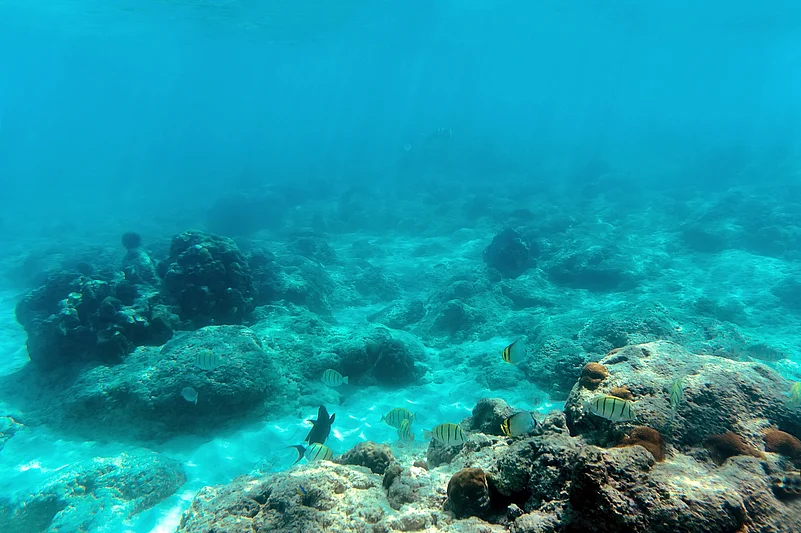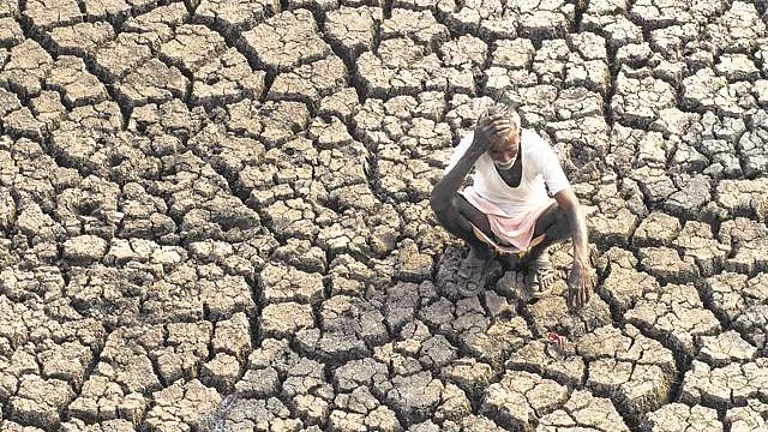
India’s coral reefs are rapidly collapsing under unprecedented ocean warming and repeated bleaching events.
Scientists warn that restoration may no longer be enough, with reefs nearing an irreversible ‘tipping point’ dieback.
As COP30 unfolds, India’s climate policies and coal reliance raise urgent questions about whether governments will act in time.
For Wenzel Pinto, the memory of his first marine research dive in Lakshadweep remains vivid. He recalls being in awe of the coral reefs there. While Pinto remembers the wonder he witnessed in 2019, his supervisor speaks of a very different Lakshadweep—the reefs of 1997, before the first mass bleaching event. That era, when reefs thrived, is now only a memory as subsequent years brought unprecedented damage.
“Restoration is utterly impossible. Our efforts are just a drop in the ocean. If you damage even one centimetre of a coral, it will take millions of years to recover naturally. Even human intervention will fall short because of the rapid pace of degradation.”
The recent Global Tipping Point Report (GTP) 2025, released ahead of COP30 as a roadmap for the climate threats the world must confront, issues an alarming warning about the future of coral reefs. It states that coral reef dieback has reached such unprecedented levels that even the most ambitious restoration efforts may no longer suffice to save these ecosystems, marking this as the planet’s first catastrophic ‘tipping point’.
Research compiled by an international team of 160 scientists indicates that Earth’s climate is already crossing tipping points as global warming approaches 1.5°C. Rising global temperatures have warmed the oceans, pushing them beyond the thermal limits within which coral reefs can survive.
According to the report, warm-water coral reefs experienced the worst bleaching event on record over 2023-25. Their thermal tipping point—1.2°C of global warming—has already been exceeded. With the planet racing towards 1.5°C, the report warns that coral reefs could face near-total disappearance unless drastic global action is taken.
Ahead of COP30, António Guterres, UN Secretary-General, acknowledged these findings and claimed that humanity has failed to limit global heating to 1.5°C and must change course immediately. He warned that it is now “inevitable” humanity will overshoot the target set by the Paris climate agreement, with “devastating consequences” for the world.
He urged the global leaders gathering at the Brazilian rainforest city of Belém to understand that the longer they delay cutting emissions, the greater the danger of passing catastrophic “tipping points” in the Amazon, the Arctic, and the oceans.
In India, the impact of these ‘catastrophic tipping points’ has been unfolding for several decades—and can no longer be ignored. The Indian Ocean, already the warmest in the world, is now warming at a pace that leaves little room for coral reefs to survive.
Despite all hard corals being listed as Schedule I species under India's Wildlife (Protection) Act, 1972, which effectively provides them with the highest level of protection, these reefs risk complete die-off in the coming decades if the climate crisis continues.
Indian Coral Reefs
The Indian coastline is no stranger to rich reef ecosystems, with them present in the Gulf of Kutch, the Gulf of Mannar, the Andaman and Nicobar Islands, Lakshadweep, and Malvan.
A recent Indian study compiling data on coral reef conditions in Lakshadweep over 24 years found that coral cover on the island has declined by a steep 50 per cent.
The study from 1998 to 2022 stated that over the past two and a half decades, coral cover declined from 37.24 per cent to 19.6 per cent, reflecting roughly a 50 per cent reduction from the 1998 baseline. This rapid dieback of the marine ecosystem is primarily due to heatwaves and rising sea temperatures—direct consequences of climate change.
These elevated water temperatures stress corals, leading them to expel the algae (zooxanthellae) living in their tissues, turning them completely white and hardening them into skeletons. This process of coral bleaching is accompanied by the loss of the marine environment they once supported, leaving behind a graveyard in the ocean.
Wenzel Pinto, a marine biologist, research assistant at Nature Conservation Foundation (NCF) and co-author on the 24-year-long research claims that, “With every bleaching event, the more resistant corals manage to survive the heatwaves, other ones that can’t adapt undergo bleaching and eventually completely die. Thus, what happens is that the reef composition changes. Moreover, we have found out that there has been a progressively sharp decline in reef recovery rates.
He adds, “Lakshadweep reefs seem to be the most vulnerable. We are currently facing another mass bleaching event.”
This longitudinal study was initiated by Pinto’s supervisor, Dr Rohan Arthur. During his PhD, he witnessed the 1998 mass bleaching event—a turning point that made him realise the need for annual documentation of coral reef health to understand how reef composition was changing over time due to climate change.
While the exact percentage is debated, experts agree that India’s coral cover has declined sharply. And now, more than ever, the impacts of climate change are impossible to miss. Coral reefs reveal this most clearly: their primary stressor is rising temperature, Pinto explains, which makes them powerful indicators of a rapidly worsening climate crisis.
Climate Culprit and Carbon Emissions
Marine biologist and professor at CHRIST University, Bangalore, Dr Amruth P. concurs that coral reefs in India are indeed facing significant die-out.
He adds, “Climate change plays a central role. Corals require a particular warm-water temperature range to survive. When the temperature rises beyond this narrow optimum, the reef ecosystem becomes stressed and begins to deteriorate. Ocean acidification further compounds the problem. Since corals are made of calcium carbonate, a drop in ocean pH weakens their structure, leading to bleaching.”
Ocean acidification is the ongoing decrease in the pH of Earth's oceans, caused by the oceans' absorption of atmospheric carbon dioxide. This process makes the ocean more acidic, which harms marine life, particularly organisms with calcium carbonate shells and skeletons, such as corals.
This has been one of the main concerns discussed at COP30— carbon emissions. Many environmentalists and experts, including Brazil’s environment minister, Marina Silva, have called for a phase-out of fossil fuels and for countries to create a roadmap to tackle carbon emissions. The issue is one of the most controversial at the COP30 summit in Brazil, with countries fighting over whether and how such a roadmap can be discussed.
India’s environment minister Bhupender Yadav claimed at the conference, “India’s emissions intensity has declined by over 36 per cent since 2005, and non-fossil sources now account for more than half of our total electric power installed capacity (currently around 256 GW), an NDC target achieved five years ahead of our 2030 goal.”
While the minister highlights India’s emissions cuts, the Climate Risk Index 2026—released on November 18 on the sidelines of COP30—tells a different story. India has slipped 13 places, ranking 23rd in the Climate Change Performance Index (CCPI).
The CCPI evaluates 14 indicators across four categories: Greenhouse Gas Emissions, Renewable Energy, Energy Use, and Climate Policy.
This year, India dropped from a “high performer” to a “medium performer,” largely due to its continued reliance on coal. The report acknowledges India’s long-term climate commitments, including a clear strategy, ambitious renewable energy targets, and established energy-efficiency programmes. But it underscores a central contradiction: India’s national trajectory still rests heavily on coal.
As the report notes, “There is no national coal exit timeline, and new coal blocks continue to be auctioned. Fossil subsidies and infrastructure lock-ins persist. The country is among the 10 nations with the largest developed coal reserves, and it currently plans to increase its production.”
The CCPI calls for a time-bound coal phase-down leading to a complete phase-out, and urges the redirection of fossil-fuel subsidies toward decentralised, community-owned renewable energy systems.
Thus, without a roadmap to reduce carbon emissions, the fate of coral reefs in India is entirely dependent on conservation efforts.
Conservation vs. Preservation
As Dr Amruth puts it, “Our efforts (conservation) are just a drop in the ocean,” the impact of decades of conservation efforts will not bring much of a difference to reefs because the rate of degradation and bleaching is exponential compared to the rate of conservation efforts.
He adds, “Nevertheless, India has certain policies and institutions working on coral conservation, including the Ministry of Earth Sciences, National Institute of Oceanography (NIO), National Institute of Ocean Technology (NIOT), and Centre for Marine Living Resources and Ecology (CMLRE). But large-scale, effective restoration remains limited.”
“Even if we undertake restoration projects, it will be very hard to return to the point at which corals were thriving,” Dr Amruth explains that the way forward for this scheduled species to continue existing is preservation.
“What we can do now is avoid disturbing the coral ecosystem altogether. Collecting corals, sea anemones, or any reef-associated organisms is completely banned—they’re protected as scheduled species. Even ship and boat routes are being diverted to ensure reefs aren’t touched. These policies are essential if we want to preserve what’s left.”
Kumar Sahayaraju, an emerging marine researcher, believes the issue might be entirely political, with the government not prioritising climate change solutions.
He says, “ In India, we actually have the talent—the scientists, the technology, the skills, even the community awareness. But conservation is very political. The power dynamics and the bureaucratic structure are hindering progress. Policies may exist, but implementing them is the real challenge. We need long-term commitment, proper monitoring, and proper management. Until the political system supports that, we will keep losing whatever reefs we have left.”
According to the Global Tipping Point report, coral reef dieback is impairing the livelihoods of hundreds of millions of people who depend on them.
Corals are the foundation of an entire underwater world. “It is a very rigid structure, and it provides an ecosystem for other organisms,” Dr Amruth says, pointing to sea anemones, reef fish and countless species that depend on corals through intricate symbiotic relationships. “You can observe that many fish and millions of organisms are residing in the coral reef.”
“Remove the coral reefs from the ocean and that entire marine ecosystem collapses,” he added.
Sahayaraju emphasised that fisheries will be the community directly affected by the decline.
“In places like Lakshadweep, you have lagoon fishing and reef-based fishing—many species depend directly on the reef. Even the tuna fishery needs baitfish that live inside these coral systems. When bleaching happens, those baitfish decline, and the fishers feel it immediately. So if the reef collapses, the livelihoods connected to it collapse too.”
While some experts, like Dr Amruth and Pinto, believe that coral reef dieback can be countered by species slowly adapting to ocean changes, the larger question remains: will world governments, including our own, be able to adapt to climate change?































